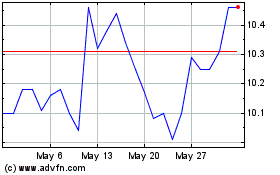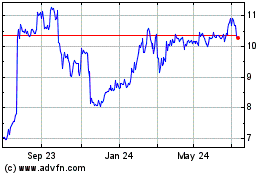U.S. Treasury Unveils New Steps to Limit Tax Inversions
April 04 2016 - 5:40PM
Dow Jones News
WASHINGTON—The Treasury Department took new steps Monday to
limit corporate tax-avoidance transactions, targeting what it calls
"serial inverters" and internal corporate borrowing that shifts
profits out of the U.S.
The rules represent the government's third wave of
administrative action against the transactions known as corporate
inversions, in which U.S. companies take foreign addresses, often
through mergers with smaller firms outside the country. The largest
such deal, Pfizer Inc.'s merger with Allergan PLC, was announced
last year and is scheduled to close in 2016.
The Pfizer deal could be endangered by the proposed rules since
Allergan itself is a product of several inversions over the past
few years.
"After an inversion, many of these companies continue to take
advantage of the benefits of being based in the United
States—including our rule of law, skilled workforce,
infrastructure, and research, and development capabilities—all
while shifting a greater tax burden to other businesses and
American families," said Treasury Secretary Jack Lew.
As he did upon releasing anti-inversion rules in September 2014
and November 2015, Mr. Lew again called for Congress to pass
short-term anti-inversion legislation and a broader revamp of the
U.S. business tax system.
The rules announced Monday would make it harder for individual
foreign companies to pick off multiple U.S. targets in a short
period of time. The new rules would prevent purchases of American
companies within the previous three years from counting as the
foreign company's assets when determining whether U.S.
anti-inversion rules apply to a new transaction.
They also go after earnings stripping, the maneuvers that
inverted companies can use to push profits outside the U.S.
Inverted companies can lend money to their U.S. subsidiaries. Those
moves, unavailable to companies based in the U.S., create
deductible interest in the U.S., reduce the income subject to the
35% U.S. corporate tax rate and move income to a lower-taxed
jurisdiction.
In those instances, the Treasury Department is basically giving
itself more authority to disregard the formal structure of those
transactions as borrowing and revoke the tax advantages of
debt.
A senior Treasury official said the rules would be effective on
deals closing after today.
Write to Richard Rubin at richard.rubin@wsj.com
(END) Dow Jones Newswires
April 04, 2016 17:25 ET (21:25 GMT)
Copyright (c) 2016 Dow Jones & Company, Inc.
Pacific Current (ASX:PAC)
Historical Stock Chart
From Apr 2024 to May 2024

Pacific Current (ASX:PAC)
Historical Stock Chart
From May 2023 to May 2024
